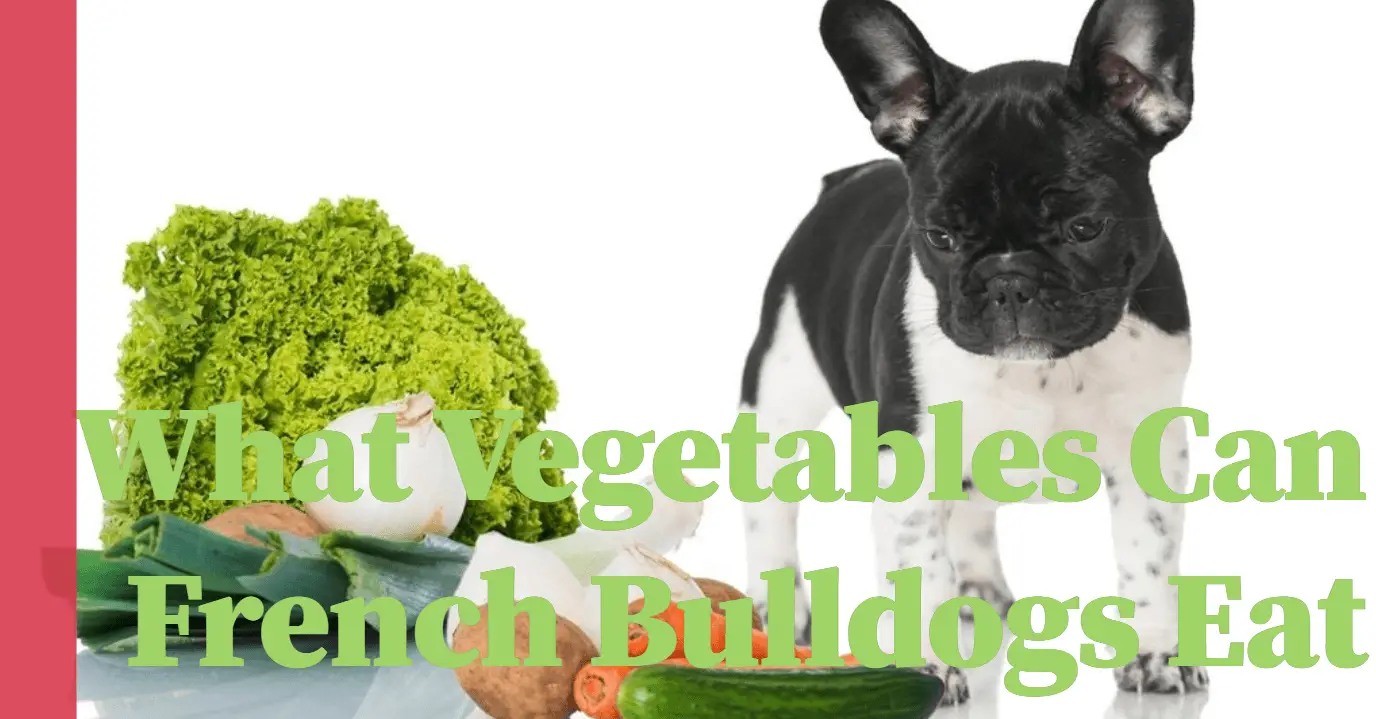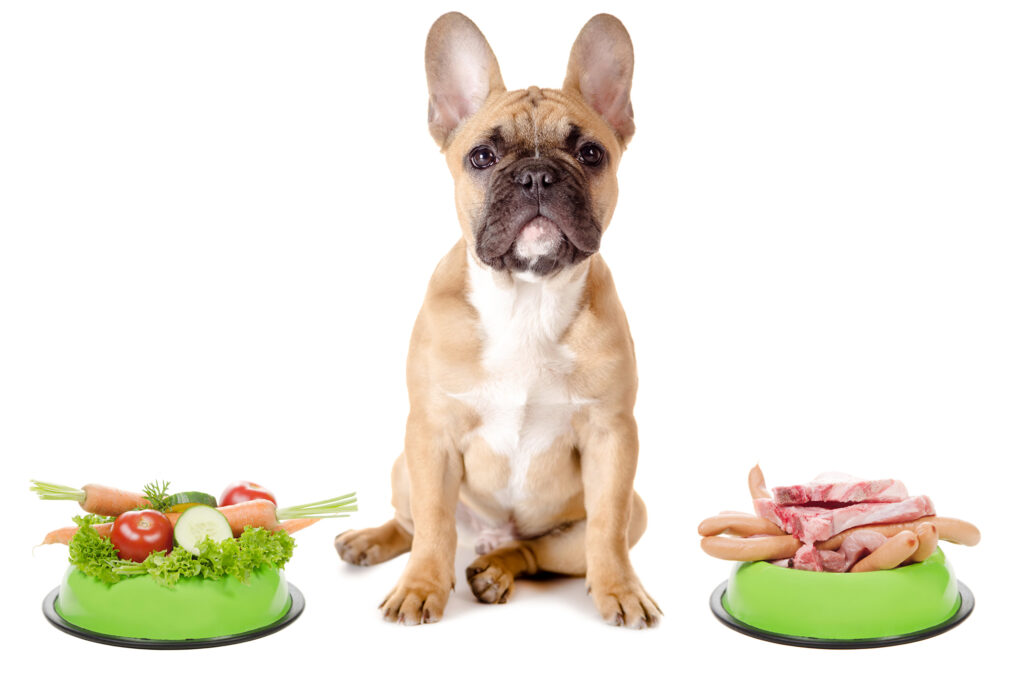
Introduction: Incorporating vegetables into a French Bulldog’s diet can provide a range of health benefits and add nutritional variety to their meals. However, it’s important to choose vegetables that are safe and suitable for their digestive system. Here are several vegetables that are generally considered safe for French Bulldogs:
Sweet Potatoes: Rich in fiber, vitamins, and minerals, sweet potatoes can be steamed or boiled and served as a tasty addition to their meals.
Carrots: Crunchy and packed with beta-carotene, carrots make a great low-calorie snack for French Bulldogs. They can be cooked, grated, or finely chopped.
Green Beans: Low in calories and high in fiber, green beans can be blanched or steamed and offered as a healthy and crunchy treat for Bulldogs.
Zucchini: With its high water content, zucchini can be a hydrating vegetable for French Bulldogs. It can be cooked, mashed, or grated for easy consumption.
Broccoli: A nutrient powerhouse, broccoli can provide vitamins, minerals, and antioxidants. Steam the florets until tender and serve them in small, bite-sized pieces.
Pumpkin: Cooked and mashed pumpkin is a great source of fiber and can help regulate digestion. It can be served as a delicious occasional treat for Bulldogs.
Spinach: Rich in iron and other essential nutrients, cooked spinach can be added in moderation to your Frenchie’s diet. Ensure it’s thoroughly cooked and offered in small portions.
Remember to introduce vegetables gradually and monitor your French Bulldog’s response. If you have any concerns or questions about specific vegetables, it’s always advisable to consult with your veterinarian for personalized advice and guidance.
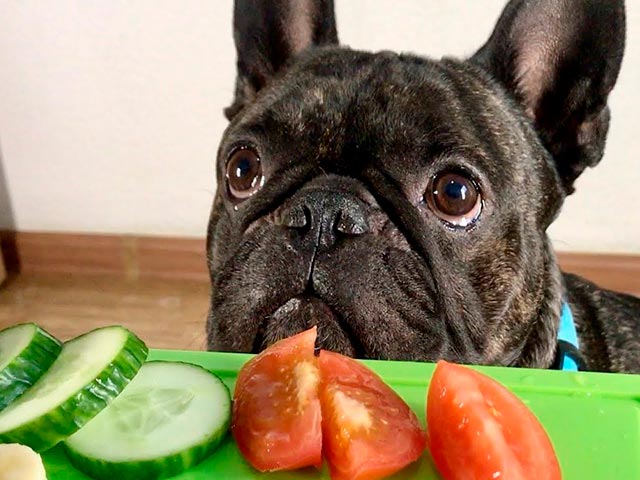
Feeding a French Bulldog puppy by month
Feeding a French Bulldog puppy by month requires careful consideration of their nutritional needs. While vegetables can be a healthy addition to their diet, it’s important to introduce them gradually and in appropriate quantities. Here are some vegetables that are generally safe for French Bulldog puppies, along with recommended quantities based on their age:
2-3 months:
- Steamed or boiled sweet potatoes: Offer small, mashed portions, around 1-2 tablespoons per serving.
- Cooked carrots: Provide finely chopped or grated carrots, about 1-2 tablespoons per serving.
4-6 months:
- Green beans: Steam or blanch the beans and serve them cut into small pieces. Offer 2-3 tablespoons per serving.
- Zucchini: Cooked and mashed or grated zucchini can be given in 2-3 tablespoon servings.
7-12 months:
- Broccoli florets: Steam the florets until tender and serve in small, bite-sized pieces. Offer around 3-4 tablespoons per serving.
- Pumpkin: Cooked and mashed pumpkin can be given in 3-4 tablespoon servings.
- Spinach: Cooked spinach can be offered in small portions, about 2-3 tablespoons per serving.
Remember to monitor your French Bulldog puppy’s response to the introduction of new vegetables and adjust quantities as needed. Always consult with your veterinarian for personalized advice and to ensure a balanced diet for your puppy.
What are French bulldogs like in terms of nutrition
When it comes to nutrition, French Bulldogs have some specific considerations due to their unique breed characteristics. Here’s what you should pay attention to when it comes to their dietary needs:
High-Quality Protein: French Bulldogs require a diet rich in high-quality animal-based protein sources. Look for dog foods that list real meat (e.g., chicken, turkey, beef) as the primary ingredient. This helps support their muscle development and overall health.
Moderate Fat Content: While French Bulldogs need a certain amount of healthy fats for energy, it’s important to monitor their fat intake. Excessive fat can contribute to weight gain and potential health issues. Opt for dog foods with a moderate fat content, typically around 12-15%.
Limited Carbohydrates: French Bulldogs are prone to food allergies and sensitivities, so it’s important to limit their carbohydrate intake. Choose dog foods that contain high-quality carbohydrates like sweet potatoes or peas, which are easier to digest for Bulldogs.
Digestibility: French Bulldogs can have sensitive digestive systems, so it’s crucial to choose easily digestible dog food. Look for formulations that include prebiotics and probiotics, which promote healthy digestion and gut health.
Avoid Allergens: French Bulldogs are prone to allergies, particularly to common allergens like wheat, corn, and soy. Opt for dog foods that are free from these ingredients to minimize the risk of allergic reactions.
Portion Control: French Bulldogs have a tendency to overeat, which can lead to obesity. Follow portion control guidelines provided by the dog food manufacturer and monitor your Frenchie’s weight regularly. Adjust the portion sizes based on their age, activity level, and overall condition.
Hydration: Bulldogs can be susceptible to heatstroke due to their brachycephalic (short-nosed) structure. Ensure they have access to fresh water at all times, especially during hot weather, to prevent dehydration.
Regular Vet Check-ups: Regular visits to the veterinarian are essential to monitor your French Bulldog’s overall health, including their nutritional needs. Your vet can provide specific dietary recommendations based on your Frenchie’s age, weight, and any underlying health conditions.
Remember, individual French Bulldogs may have unique nutritional requirements, so consulting with a veterinarian or canine nutritionist is always recommended to develop a tailored diet plan for your Frenchie.
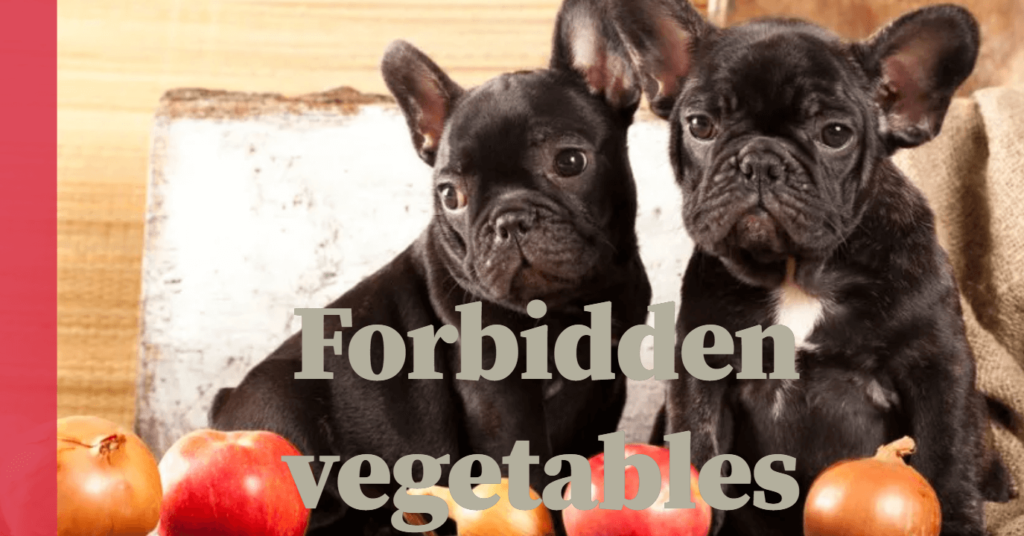
Prohibited foods for French Bulldogs are items that should be avoided due to potential health risks and adverse effects on their well-being. Here are some foods that are commonly prohibited for French Bulldogs and the reasons why:
Chocolate: Chocolate contains theobromine and caffeine, which are toxic to dogs. Ingesting chocolate can lead to symptoms like vomiting, diarrhea, increased heart rate, tremors, and even seizures.
Onions and Garlic: These vegetables, whether raw, cooked, or in powdered form, contain compounds that can damage a dog’s red blood cells, leading to anemia. The risk is higher for French Bulldogs due to their smaller size.
Grapes and Raisins: Grapes and raisins can cause kidney failure in dogs, even in small amounts. Symptoms may include vomiting, diarrhea, lethargy, and decreased appetite.
Avocado: Avocados contain a substance called persin, which is toxic to dogs in large quantities. Consumption can lead to digestive issues, breathing difficulties, and fluid accumulation around the heart.
Caffeine: Caffeine, found in coffee, tea, energy drinks, and certain medications, can be harmful to dogs. It can cause restlessness, rapid breathing, increased heart rate, tremors, and even cardiac arrhythmias.
Alcohol: Alcohol is highly toxic to dogs. Ingesting even small amounts can lead to alcohol poisoning, resulting in symptoms like vomiting, disorientation, difficulty breathing, tremors, and even coma.
Xylitol: Xylitol is an artificial sweetener found in many sugar-free products, such as gum, candy, and baked goods. It can cause a rapid drop in blood sugar levels, leading to weakness, seizures, and liver failure in dogs.
Macadamia Nuts: Macadamia nuts can cause weakness, tremors, vomiting, and elevated body temperature in dogs. It’s important to keep these nuts away from French Bulldogs.
Raw Meat and Fish: Raw meat and fish pose a risk of bacterial contamination, including Salmonella and E. coli, which can cause severe gastrointestinal issues in dogs.
High-Fat Foods: French Bulldogs are prone to obesity and digestive issues. High-fat foods like fatty meats, fried foods, and rich gravies can lead to pancreatitis and other health problems.
It’s crucial to be aware of these prohibited foods and keep them out of your French Bulldog’s reach to ensure their well-being and prevent any potential health complications. If your dog accidentally ingests any of these items or exhibits concerning symptoms, contact your veterinarian immediately.
What to do if the dog has diarrhea… how to treat it
If your dog has an upset stomach and is experiencing diarrhea, there are several steps you can take to help treat the condition.
Consulting with a veterinarian is always the best course of action for proper diagnosis and treatment. That being said, here are some general guidelines:
First Aid and Initial Care:
Withhold Food: Temporarily withhold food for 12 to 24 hours to give your dog’s digestive system a chance to rest. Ensure they have access to clean water to prevent dehydration.
Bland Diet: After the fasting period, gradually reintroduce a bland diet consisting of boiled white meat (chicken or turkey) and plain white rice. This helps to soothe the stomach and provide easily digestible nutrition.
Probiotics: Consider giving your dog a probiotic supplement or plain, unsweetened yogurt with live active cultures to help restore the balance of good bacteria in the gut.
Hydration: Encourage your dog to drink water to prevent dehydration. If they are reluctant to drink, you can offer small amounts of diluted chicken broth or water ice cubes to entice them.
Rest and Monitor: Provide a calm and quiet environment for your dog to rest. Monitor their condition closely, noting any changes in behavior or worsening symptoms.
Medical Treatment: It’s crucial to consult with a veterinarian for a proper diagnosis and guidance on medical treatment. Depending on the underlying cause and severity of the diarrhea, your vet may recommend:
Prescription Medication: Your vet may prescribe medications to address the specific cause of the diarrhea or to help alleviate symptoms such as anti-diarrheal medications or antibiotics if an infection is suspected.
Fluid Therapy: In severe cases of dehydration, your vet may administer fluids intravenously or subcutaneously to rehydrate your dog.
Diagnostic Tests: In some cases, your vet may recommend fecal tests or other diagnostic procedures to identify the cause of the upset stomach and diarrhea.
Remember, every dog is unique, and the treatment plan may vary based on the individual case. Always seek professional veterinary advice to ensure the best care for your furry friend.
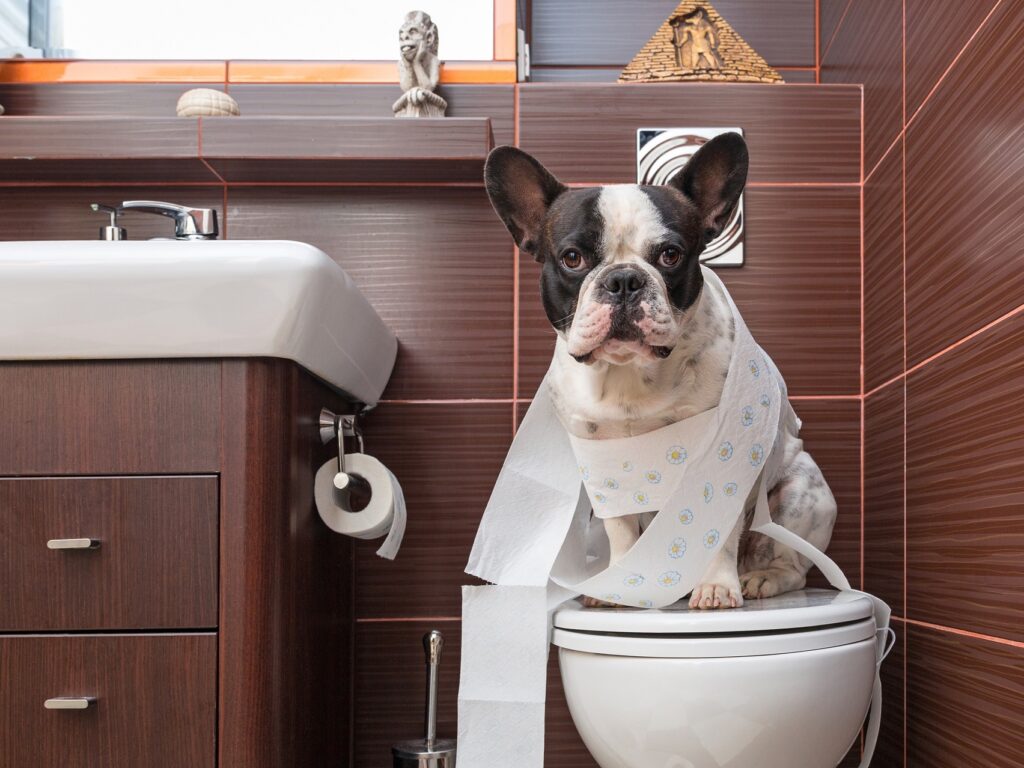
Frequently Asked Questions
Q: Can French Bulldogs eat vegetables? A: Yes, French Bulldogs can eat certain vegetables as part of a balanced diet. Vegetables like sweet potatoes, carrots, green beans, and broccoli can provide nutritional benefits for French Bulldogs.
Q: Why are vegetables important in a French Bulldog’s diet? A: Vegetables offer essential vitamins, minerals, and fiber that contribute to a healthy diet for French Bulldogs. They can support digestion, provide antioxidants, and contribute to overall well-being.
Q: How should vegetables be introduced to a French Bulldog’s diet? A: Vegetables should be introduced gradually to a French Bulldog’s diet to avoid digestive upset. Start with small portions, cooked and finely chopped, and observe their response. If any adverse reactions occur, consult with a veterinarian.
Q: Which vegetables are particularly beneficial for French Bulldogs? A: Vegetables like sweet potatoes (cooked and mashed), carrots (cooked or grated), green beans (blanched or steamed), and broccoli (steamed florets) can be beneficial for French Bulldogs due to their nutrient content.
Q: Can all vegetables be fed to French Bulldogs? A: Not all vegetables are suitable for French Bulldogs. Some vegetables, such as onions, garlic, and avocados, are toxic to dogs and should be avoided. It’s important to research and ensure the vegetables you offer are safe for canine consumption.
Q: How can a vegetable-rich diet benefit a French Bulldog’s health? A: A vegetable-rich diet can provide French Bulldogs with essential nutrients, aid in digestion, support a healthy immune system, and contribute to weight management. However, it’s important to maintain a balanced diet that includes other necessary food groups for their overall health.
Remember, each French Bulldog is unique, and dietary needs may vary. It’s best to consult with a veterinarian for personalized advice and guidance on your French Bulldog’s specific dietary requirements.
